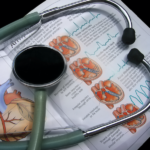 Stress can cause you to have a lowered immune response which can lead to colds, flu, and illness.
Stress can cause you to have a lowered immune response which can lead to colds, flu, and illness.
Stress has a very tangible effect on your entire body, on your emotions, and on your mind. While small amounts of stress can be healthy and even a motivating factor, ongoing constant states of stress put your body into an unnatural version of the fight or flight response and can cause a world of problems.
When it comes to the world of chiropractic there are three kinds of stress that affect the skeletal system influencing alignment. They are the main reasons most basic components of human health.
CHEMICAL STRESS
Body chemistry affects muscle tone. When muscles tighten, the tension can pull on the bones that they are attached. This can cause misalignments.
Some of the most common causes of chemical imbalance or chemical stress include nutrient deficiencies (calcium, magnesium, potassium, and so on) smoking, alcohol, caffeine, processed foods, and other toxins.
Nutrients affect muscles by allowing them to relax. When your body has a lack of nutrients, quickly follows is the inability to allow the muscles to relax. Chemical toxins such as processed foods, smoke, alcohol, and VOCs can affect muscles by irritating the nerves. When we eat processed food, the body reacts to the food as it is a toxin. Because of this the nerves in the stomach send signals to the brain releasing stress hormones that cause a change in muscle tonicity. All of this affects the way our body is aligned.
PHYSICAL STRESS
When any physical stress occurs, bones can be shifted out of alignment due to impact, tension, or physical force. Strangely, although physical stress is the most well-known of the three, it is actually the least common cause of misalignments.
EMOTIONAL STRESS
Emotional stress is one of the most common reasons that the body ends up misaligned. Financial stress, job stress, political climate stress, family stress, and health-related stress just to name a few. These stress sources can cause us to subconsciously tighten our muscles, raise our shoulders, release cortisol, and remain on high alert physically. It causes an increase in tension and pulls on the skeletal frame.
Stress: The Outcome
Most misalignments are due to a combination of all three stress categories above. The unfortunate thing is that most people don’t go see the chiropractor until they feel pain. Pain is your body’s last form of defense when it comes to correcting itself.
Chiropractic care can be used preventatively. Getting adjusted regularly can stop a person from reaching pain and needing more frequent treatments. Signs that you could have a misalignment can include loss of range of movement, a pinching feeling, changes in body function, tight muscles, a decrease in body function, headaches, and random aches and pains. Also frequent colds are a sign of misalignments as they can prevent your nervous system from working full force.
It is important to regularly get checked by your chiropractor to make sure these three stressors are kept in check. If you have any questions about how these stressors can directly affect the way you are feeling, feel free to give us a call at 239-332-2555 www.kasterchiropractic.com.


 If you’ve ever experienced depression you understand that it can sometimes feel like you have a broken or heavy heart.
If you’ve ever experienced depression you understand that it can sometimes feel like you have a broken or heavy heart. 
 Anxiety disorders affect 40 million adults in the USA.
Anxiety disorders affect 40 million adults in the USA. 
 In years since 2012, all drivers licensed in Florida have been required to carry what is known as PIP coverage. That stands for Personal Injury Protection.
In years since 2012, all drivers licensed in Florida have been required to carry what is known as PIP coverage. That stands for Personal Injury Protection. Chiropractic care is a safe, alternative treatment when applied appropriately. Chiropractic treatments help in dealing with the symptoms of many conditions. Are you going to wait for your symptoms to be felt, or are you going to prevent it as soon as possible?
Chiropractic care is a safe, alternative treatment when applied appropriately. Chiropractic treatments help in dealing with the symptoms of many conditions. Are you going to wait for your symptoms to be felt, or are you going to prevent it as soon as possible?

 Many people leave the television on for noise as they go to sleep, but the question becomes, is this bad for our health?
Many people leave the television on for noise as they go to sleep, but the question becomes, is this bad for our health?


 Do you have anxiety but are reluctant to medicate due to the enormous list of possible side effects? We don’t blame you one bit!
Do you have anxiety but are reluctant to medicate due to the enormous list of possible side effects? We don’t blame you one bit!